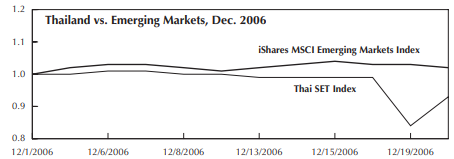Thailand’s new government, installed via military coup in September, blundered badly when, on December 19th, it imposed new restrictions on foreign investors. The result was bad for Thailand and bad for emerging market investors who were diversified inadequately. We suspect, however, that the lessons conveyed will ultimately prove to be a boon to capital markets, global prosperity, and perhaps freedom in general.
The government had apparently decided that too much foreign investment was a bad thing. An inflow of capital that had sent the Thai stock market skyrocketing had also sent the Thai currency (the Baht) to new highs. This in turn hampered export growth. The new rules were harsh: foreign investors were required to lock up 30 percent of their funds with the Thai central bank and investors who decided to pull out of Thailand before one year would lose one third of their “deposit.”
This was not a great day for emerging-market investors, but neither was it disastrous. The restrictions were revised quickly and Thai stocks partially rebounded in response. The damage to the government’s credibility however, had been done. The Thai stock market plunged 15 percent, but the Vanguard Emerging Markets Index, which tracks the MSCI Emerging Markets Index, lost only 1 percent.
It is encouraging that, unlike the Asian crisis ten years ago, the market’s rebuke was confined largely to Thailand. The message to interventionists is clear: capital markets will discriminate brutally between governments that respect property rights and those that do not. The goal of an emerging nation is, presumably, to one day emerge, and join the ranks of developed nations. This distinction will be made not by declaration of the United Nations, the World Bank, or by inclusion in any politically determined assemblage of nations.
These countries will know they have “arrived” when, among other things, they appear among developed market indexes. Investors should maintain their exposure to emerging markets by adhering to the recommended portfolio allocations we publish quarterly. This asset class will continue to be highly volatile. These nascent, often narrowly based economies are inherently more vulnerable than developed economies, and political risks will not disappear. Patient investors will be rewarded commensurately.

Also in This Issue:
Estate Planning for Concentrated Stock Positions
How Safe is Your Bank Account?
Are We Having Fun Yet?
The High-Yield Dow Investment Strategy
Recent Market Statistics
The Dow-Jones Industrials Ranked by Yield
Asset Class Investment Vehicles
To access the full article, please login or subscribe below.
Already a Subscriber?
Log in now
Subscribe Today
Get full access to the Investment Guide Monthly.
Print + Digital Subscription – $59/YearIncludes 12 Print and Digital Issues
Print + Digital Subscription – $108/2 Years
Includes 24 Print and Digital Issues
Digital Subscription – $49/Year
Includes 12 Issues
Digital Subscription – $98/2 Years
Includes 24 Issues

